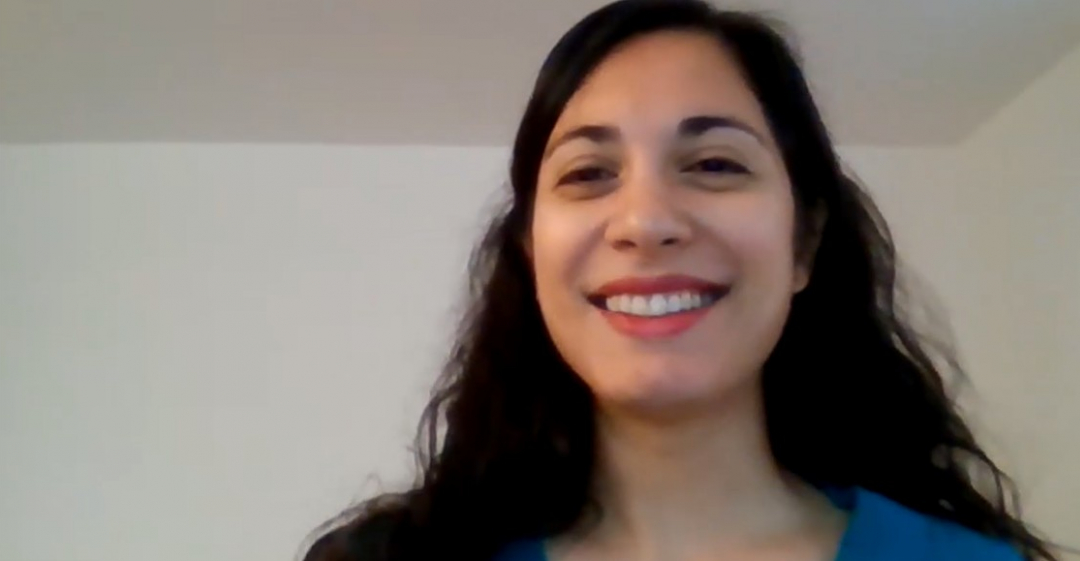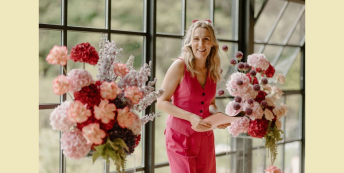“I became more withdrawn because I wasn't happy in my day to day.”

What work were you doing previously?
Before the shift I was working in post-production as a video operations manager in a big company.
As well as that, I am a trained visual translator – that was my first career and part of what I still do.
What are you doing now?
Now I have a portfolio career.
I'm still an audio-visual translator, and alongside that I'm also a researcher in digital humanities.
How did you feel in your work before you decided to make the change?
In my employed job I was feeling less and less motivated.
The impact it had on me was that I felt less confident about myself and my abilities. You carry that lack of confidence with you in your life, so you feel less strong not just at work but in other areas of life.
I think I became more withdrawn because I wasn't happy in my day to day. I was less of a chatterbox and I engaged in things less.
Why did you change?
On paper it was a pretty great job – in practice it was less good.
It was not challenging in the right ways and I felt a bit brain dead. After a while I thought that I need to do something about this, to get myself out and be in a better space.
When was the moment you decided to make the change?
There was a period of time where I was a bit manic looking at all the possible things I could do.
I was looking at job websites frantically. The things I was finding weren't necessarily that interesting, or didn't really fit my interests, or would be more of the same thing.
I had some interviews and was offered a job in the same area and realised that I didn't want to do the same thing anymore.
It was scary to turn the opportunity down. I felt like I was taking some action in a way by saying no. But also dread – what am I going to do instead?
When I realised I really didn't want to do the same thing, that's when I started to look into career change as a topic.
How did you choose your new career?
It started with me collecting in a word document everything I was interested in (articles, books, films).
Then I looked at it all almost with a researcher's mind to find common themes, what was jumping out at me. I could see clearly that I spent lots of time on this topic or listening to podcasts on this topic.
Then I talked to as many people as I could who knew about these areas or worked in these areas.
Are you happy with the change?
I feel a lot more calm.
I'm not using my energy in ways that drain me or give nothing back. I feel happier.
It's not a rosy picture where everything's great – there are still challenges. I work pretty much freelance all the time and this has its own challenges.
But overall I feel like it's what I want to do and it’s the right thing for me. I love what I'm doing and am passionate about my work as a translator, and love doing research.
How did you go about making the shift?
It was a really informed decision – I decided that I wanted to make a shift and I was going to put in the time and effort.
To prepare for it, I worked as much as I could and a bit more than usual to help with finances. I took time during the week to dedicate several hours on my shift – meeting and talking to people, research etc.
Life is busy, but you have to be a bit boundaried and set dedicated time to work on your shift (for example let your partner or family know that between 2pm-4pm on Friday I'm not to be disturbed, then from 4.05pm I'm all yours).
How did you develop (or transfer) the skills you needed for your new role?
In my case I decided to study a bit more. It was the right thing for me as I am a bit of a nerd, so I feel more confident by learning and extra studying.
You can't go into a costly or lengthy retraining program without knowing it's right for you. I started doing free or low-cost courses in things I was thinking about to see if it's what I really want to do, and to see what my knowledge gaps were.
Then I went to the institution where I decided to study longer-term and spoke to everyone I could (students, the course directors), and went to the open days. I went in with a systematic approach – who do I need to speak to, where do I need to go, what do I need to know.
My existing skills also really supported me with my shift. I used what I already knew to be able to do something a bit different.
How did you handle your finances to make your shift possible?
When I was sure I was going to change I immediately started saving.
My career change became a priority. It meant other things had to go on the backburner for a while, like saving money for my own place.
For my specific career change I had the option of applying for grants, so I did a lot of funding research for what was available to me.
I worked alongside my shift as a freelance translator which kept money coming in.
What was the most difficult thing about changing?
Fears around the change – ‘What am I doing?’, ‘This is absolutely crazy’, ‘Why would I do this to myself’, How am I going to pay for this?’, ‘Am I capable of it?’.
What resources would you recommend to others?
Speaking to other people.
People at work were very useful – I worked in a huge company where there was a range of people doing very different things.
I didn't talk to my immediate team. It was other areas – people who didn't have any connection with my team. I'd say “tell me about your job, what do you like about it, why are you excited about it?”, rather than telling them that I was thinking about a career change.
I also relied a lot on my friends and asking what their friends did, and if I could speak to them about their different work.
What have you learnt in the process?
I think doing things that you feel good about and are interested in has a grounding effect.
You feel more grounded in your life because you are confident and clear about what you're doing and what you want to do.
I’ve become more open to the world and people. Being self-employed I have to be out there in the world and now I'm more able and willing to go out and talk to people.
I continue to talk to people about what they do to give me more ideas and learn from others' experiences.
What do you wish you'd done differently?
I wish I had been a little bit more honest with my partner about the shift and the worries it was causing me sometimes, especially financially.
I ended up working a lot to make up for less money coming in. If I had been more upfront with my worries, we could have handled it together .
So I'd say if you can be open about what you're doing, that will be helpful.
What would you advise others to do in the same situation?
Keeping your eye on the goal is helpful.
I wasn't always motivated, it wasn't always great. Sometimes I felt a bit discouraged, but I guess it's normal. The journey isn’t always linear, it has ups and downs.
I needed to think “I'm going to do something that's ultimately going to bring me more energy and joy so it's worth it.” You just have to ride it out. Sometimes it will be difficult and sometimes it will be great. But keep going.
Cristina took part in our Career Change Launch Pad. If you're ready to join a group of bright, motivated career changers on a structured programme to help you find more fulfilling work, you can find out more here.



